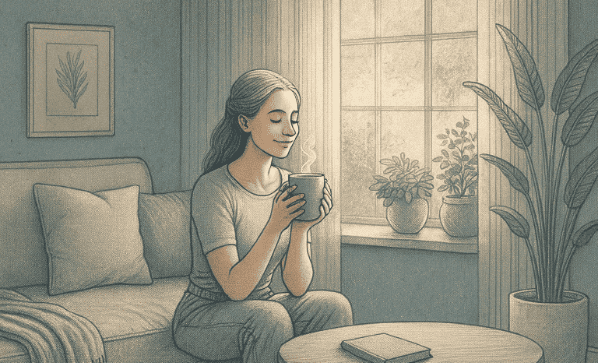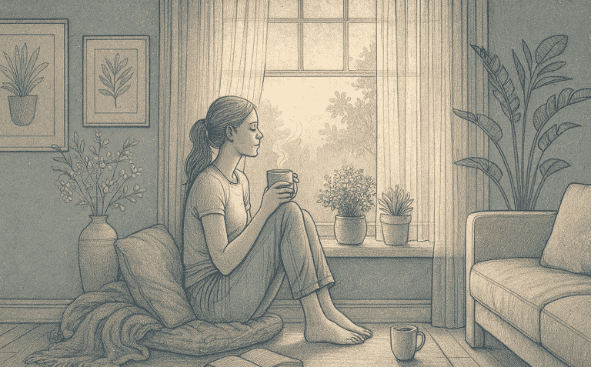Key Takeaways
- Mental health and happiness are deeply connected, with your mental wellness directly influencing your ability to experience joy, satisfaction, and contentment in daily life.
- Mental health challenges can affect happiness through changes in mood, energy levels, motivation, and the way you perceive yourself and your experiences.
- Warning signs that mental health is impacting happiness include persistent low mood, loss of interest in activities you once enjoyed, difficulty finding pleasure in daily moments, and withdrawal from relationships.
- Improving mental health leads to greater happiness through daily practices like maintaining routines, staying connected with others, engaging in activities that bring meaning, and being kind to yourself.
- A Mission For Michael (AMFM) offers comprehensive mental health treatment programs that help individuals rebuild their sense of well-being, develop healthy coping skills, and rediscover joy through evidence-based therapies and supportive care.
Understanding the Mental Health-Happiness Connection
Mental health and happiness go hand in hand, yet they’re not quite the same thing. Your mental health is the foundation that makes happiness possible. When your mental wellness is strong, you’re better equipped to handle life’s ups and downs, find meaning in your experiences, and feel satisfied with your life. When mental health struggles, happiness often becomes harder to access and maintain.
This connection runs deep. Mental health affects how you think, feel, and interact with the world around you. It influences your energy, your relationships, your sense of purpose, and your ability to enjoy the present moment. Understanding this relationship is the first step toward creating positive change in both areas of your life.
Founded in 2010, A Mission For Michael (AMFM) offers specialized mental health care across California, Minnesota, and Virginia. Our accredited facilities provide residential and outpatient programs, utilizing evidence-based therapies such as CBT, DBT, and EMDR.
Our dedicated team of licensed professionals ensures every client receives the best care possible, supported by accreditation from The Joint Commission. We are committed to safety and personalized treatment plans.
The Relationship Between Mental Health and Happiness
What Mental Health Really Means
Mental health covers your emotional and psychological wellbeing. It shows in how you manage stress, build relationships, make choices, and recover when life gets tough. The way you see yourself, handle feelings, and navigate daily challenges all reflect your mental state. Like physical health, it changes over time and benefits from care and support.
Understanding True Happiness
Happiness goes beyond quick bursts of joy; it includes lasting satisfaction, purpose, and connection. It’s feeling gratitude, finding meaning in your activities, and staying hopeful even during difficult times. Strong mental health provides the foundation that helps you sustain these positive emotions.

Mental health creates the foundation for experiencing genuine happiness, life satisfaction, and emotional wellbeing.
How Mental Health Challenges Impact Your Happiness
Emotional and Mood Effects
When mental health struggles arise, one of the first things affected is your emotional experience. You might find it harder to feel joy or excitement about things that used to make you happy. Your mood may feel flat, heavy, or constantly shifting. Small disappointments might feel overwhelming, while positive moments don’t register as strongly as they once did.
These emotional changes aren’t a choice or a weakness. They’re real symptoms that affect how your brain processes experiences and emotions. The colors of life can feel muted, and even good days might not bring the satisfaction they should.
Daily Functioning and Energy
Mental health challenges often drain your energy and motivation. Simple tasks that once felt manageable might now feel exhausting. Getting out of bed, completing work, or maintaining your home can require enormous effort. This decreased functioning makes it harder to engage in activities that bring happiness and fulfillment.
When everything feels like a struggle, there’s little energy left for the things that create joy and meaning in life. This creates a cycle where reduced activity leads to less happiness, which in turn makes it even harder to stay active and engaged.
Relationships and Social Connection
Your mental health significantly influences how you connect with others. When struggling, you might withdraw from friends and family, even though connection is something you need. Social situations that once felt easy might now feel draining or anxiety-provoking. You might worry about burdening others or feel like you have nothing to offer in relationships.
Since meaningful relationships are a major source of happiness, this disconnection directly impacts your overall life satisfaction. The isolation that often accompanies mental health challenges removes one of the most important sources of joy and support.
Self-Perception and Confidence
Mental health struggles can change how you see yourself. Negative thoughts might become louder and more persistent. You might be harder on yourself, doubt your abilities, or feel unworthy of happiness. These self-perceptions create barriers to experiencing joy, even when good things happen.
When you don’t feel good about yourself, it’s difficult to accept positive experiences or believe you deserve them. This internal narrative directly affects your ability to feel happy and satisfied with your life.

Mental health challenges affect happiness through changes in mood, energy, relationships, and self-perception.
Signs Your Mental Health May Be Affecting Your Happiness
Emotional Warning Signs
Watch for sadness or emptiness that lingers. Irritability over little things, frequent tears without clear reasons, or feeling emotionally numb are all signals worth noting. Losing interest in activities that once brought joy, or struggling to feel gratitude and notice positive moments, are also signs that your mental health may need care.
Behavioral Changes
Changes in sleep patterns, whether sleeping too much or too little, along with sudden changes in appetite or weight can point to deeper issues. Pulling away from friends, family, and regular activities is another red flag. Trouble focusing, making decisions, or finishing everyday tasks can show your mental health is affecting your life. Neglecting self-care, avoiding responsibilities, or lacking motivation are all cues it’s time to give your wellbeing attention.
Building Better Mental Health for Lasting Happiness
Daily Practices That Help
Simple, steady habits can lift both your mood and mental health. A regular routine, like waking up at the same time, eating balanced meals, and keeping up with basic self-care, creates stability. Staying connected with others through a quick call, a message, or shared time adds an important layer of support.
Movement also matters. Walks, stretching, or any activity you enjoy can boost energy and balance your mood. Meaningful activities like creative projects, helping others, or spending time in nature add depth to happiness. Being gentle with yourself during tough moments helps your mind heal and grow stronger.
When Professional Support Makes a Difference
While self-care practices are valuable, sometimes mental health challenges require professional treatment. If your symptoms persist, interfere with your daily life, or feel overwhelming, reaching out for help is a sign of strength, not weakness. Professional support provides tools, perspectives, and interventions that aren’t accessible on your own.
Treatment can help you understand the root causes of your struggles, develop effective coping strategies, and rebuild your sense of wellbeing and happiness. Many people find that working with mental health professionals creates breakthroughs that self-help alone couldn’t achieve.
Why Choose AMFM for Mental Health Treatment

AMFM provides comprehensive mental health treatment in welcoming environments designed to support healing and personal growth.
At AMFM, we understand that mental health and happiness are inseparable. Our treatment programs address the full picture of your wellbeing, helping you rebuild both your mental wellness and your ability to experience genuine joy and satisfaction in life.
Our residential programs offer immersive, 24-hour support where you can step away from daily stressors and focus completely on your healing. Through evidence-based therapies including cognitive behavioral therapy, mindfulness practices, and specialized interventions, you’ll learn to understand your mental health patterns and develop skills that create lasting change.
For individuals who need comprehensive daily treatment while maintaining some flexibility, our partial hospitalization programs provide intensive therapeutic support with evening hours at home. These programs help you apply new skills in real-world situations while maintaining strong clinical support throughout your treatment journey.
Our outpatient programs serve those ready to continue their healing while managing work and personal responsibilities. These programs provide ongoing therapy, skill-building, and support that help you maintain progress and prevent mental health challenges from returning.
We also recognize that family members play an important role in mental health recovery. Our family support and education programs help loved ones understand mental health conditions and learn supportive approaches that encourage healing and happiness for everyone involved.
With facilities in California, Virginia, Minnesota, and Washington state, AMFM provides evidence-based treatment in comfortable, healing environments. We work with most major insurance providers and make beginning treatment straightforward through comprehensive insurance verification and personalized treatment planning.
Frequently Asked Questions (FAQ)
Can you be happy even with mental health challenges?
Yes, happiness is possible even when managing mental health conditions. Treatment, support, and effective coping strategies can help you experience joy and life satisfaction alongside your mental health journey. Many people find that addressing their mental health actually deepens their capacity for genuine happiness.
How long does it take for mental health treatment to improve happiness?
The timeline varies for each person depending on the severity of symptoms and the type of treatment. Some people notice improvements in mood and outlook within weeks, while deeper changes in overall happiness often develop over several months of consistent treatment and practice.
What’s the difference between temporary sadness and mental health affecting happiness?
Temporary sadness is a normal emotional response to difficult situations and typically passes with time. When mental health is affecting happiness, symptoms persist for weeks or months, interfere with daily functioning, and don’t improve with usual coping strategies or positive changes in circumstances.
Will treating my mental health guarantee I’ll be happy?
Mental health treatment provides the foundation for happiness by addressing the barriers that prevent you from experiencing joy and satisfaction. While treatment doesn’t guarantee constant happiness (which isn’t realistic for anyone), it significantly improves your capacity to experience genuine wellbeing and contentment in your life.
How does AMFM help people rediscover happiness through mental health treatment?
AMFM’s programs address both the symptoms and root causes of mental health challenges through evidence-based therapies, skill development, and comprehensive support. By improving mental wellness, emotional regulation, and coping abilities, individuals naturally regain their capacity for joy, meaning, and life satisfaction.







